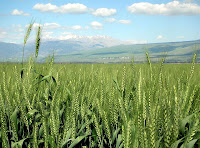 When we think of Africa, we often think of disease, poverty, oppression, and hardship. The whole continent is looked at as backwards and worthless, a place where people will never be able to rise above what they have or produce all their need without help. Unfortunately much of this is true—in many places, Africa is a mess. However, what many people do not realize is that the fate of the world may be dependent upon the Dark Continent, and if we do not help Africa clean up its act we will all pay the price.
When we think of Africa, we often think of disease, poverty, oppression, and hardship. The whole continent is looked at as backwards and worthless, a place where people will never be able to rise above what they have or produce all their need without help. Unfortunately much of this is true—in many places, Africa is a mess. However, what many people do not realize is that the fate of the world may be dependent upon the Dark Continent, and if we do not help Africa clean up its act we will all pay the price.What am I talking about? Overpopulation, believe or not. Though Africa has some of the lowest birth rates in the world, it is crucial to the battle against overpopulation because of its one abundant natural resource: arable land. Africa possess huge tracts of untouched land that can be easily cleared for farming, but the political and social situation has prevented Africans from taking advantage of this. Though Asia, Europe, and the Americas export several times the amount of crops that Africa does, more that 70% of these continents’ arable land is already being used—there is little room for improvement. Africa’s though, it largely untouched—there is the potential to grow millions of hectares of crops there. This may be what ends up winning the battle against overpopulation, at least for now.
But we’re going to have to act fast. Experts predict that the population crisis may create a “perfect storm” of shortages as soon as 2030. Though this may not cause global collapse, it will almost certainly cripple the world economy and result in shortages of food, water, and other resources. If Africa’s arable land is not put to good use soon, the crisis may have catastrophic effects.

How can we do this? Unfortunately, it’s not going to be easy, and it’s not going to happen very quickly. There are two general avenues of approach to this problem: direct and indirect. The direct method would have the most opposition, but it would probably be the most efficient. This direct method would involve Western agribusiness corporations purchasing large areas of land from African governments and then hiring people to work them (whether immigrants from other countries or simply natives). If governments resist, the UN and AU can be used to put pressure on these governments until they relent. The UN should closely oversee the whole operation, and peacekeeping troops may be needed to keep guerilla separatist/resistance groups down.
The indirect method may not work at all, but it would cost less and would not harm the current African governments. This would involve subsidizing and investing in African agribusiness to spur on an agricultural revolution. If we can turn Africa in to a major food exporter, this will not only help the welfare of the African nations involved but also put that fertile land to good use, which is the ultimate goal. Though this would still be costly and some of the money may go to waste because of looting African governments, it would not be as imperialistic as the direct method.
Can we do it? I believe the answer depends upon whether we act fast. This project is going to take several decades to yield any meaningful results, so if we do not act quickly there it may be too late. I do not know how current governments feel about this issue, but I am sure they are aware of it. We can only hope that they will realize what needs to be done and do it without hesitation.

No comments:
Post a Comment